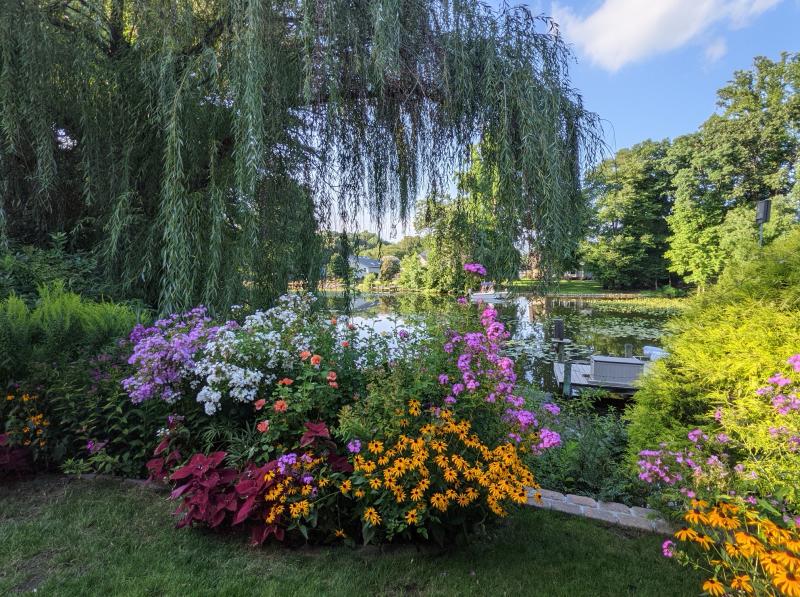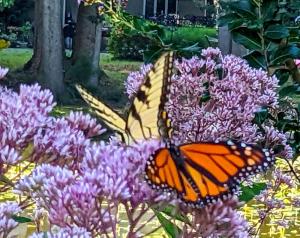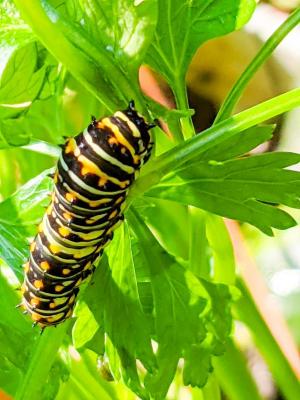Mill Pond Garden will welcome visitors from 10 a.m. to 1 p.m., Sunday, Aug. 21, at at 31401 Melloy Court, Lewes.
Patrons will see abundant featured flowers, along with butterflies and caterpillars as well as hummingbirds and many pollinating insects visiting the native host plants like Joe Pye weed, tall phlox, hibiscus, salvia, cardinal flower and more.
Local gardeners may see for themselves what can be done to get so many beauties together in a Cape Region garden for success, enjoyment and the greatest support of native pollinators.
Tickets, available at millpondgarden.com, are $15 to admit a vehicle with up to six visitors. For the safety of all, visitors are asked to keep safe social distance from other groups.
The first recommendation for area gardeners is to select plants blooming at different times so there is a continuous supply of nectar for pollinators, and some host plants for caterpillars throughout the season. Consider planting flowering plants that attract pollinators for the whole growing season, March to December. The kinds of flowers chosen need to be varied to feed and attract the many types and sizes of pollinators. Some, like the parasitic wasps that control insect pests in gardens, and the tiny bees and flies, need very small, flat flowers like those on many herbs.
Remember that butterflies are not the only pollinators, even if they’re among the prettiest ones. Bees are far more important in the scheme of nature’s needs for fertilization, fruiting and forming seeds. There are over 200 native species of bees in Delaware, and they all need help, along with many types and sizes of wasps and flies that pollinate.
To promote the pollinators, especially the little ones, it is necessary to leave their eggs to winter over in place in the garden. Leave beds untidied until the spring. When cleaning up the beds, don’t toss the cut stems of perennials; instead, pile them in corners or along edges so the egg cases can hatch out to provide ongoing protection for the garden from insect pests.
Consider not spraying any insecticides, especially the mosquito-control chemicals that kill the good insects as well as the bad. The mosquitoes will repopulate fast, but the beneficial insects will not. The most effective mosquito-control measures are easier and safer than insecticides, and free. A dry garden has no mosquitoes. Clean up and remove all items in the garden that trap water, even upside-down bottle caps, and there will be no place for mosquitoes to breed.
Another mosquito-control measure is having some kind of pond. Even a very small pond or water barrel will attract a frog and support a goldfish or two. The goldfish, frogs and tadpoles will eat any mosquitoes that lay eggs in the water. The pond will also attract damselflies and possibly some dragonflies which will forage on insects, especially daytime Asian tiger mosquitoes. If one can attract bats by putting up a bat box, the bats will eat the nighttime mosquitoes.
The most effective way to deal with mosquitoes is by this combination of breeding prevention and providing predators for them around the clock. Let nature provide the balance. Any small water feature will also attract and benefits birds, frogs, salamanders and small wildlife.
Mill Pond Garden is a small holistic botanical garden on beautiful Red Mill Pond. Holistic means the garden follows the principles of nature not only in the creation of beauty but also of a complete and safe habitat where animals and insects can thrive as abundantly as possible. It includes a stream along with ponds for koi, frogs, and turtles, and several fountains where birds can bathe and drink. The grounds host resident squirrels, flying squirrels, raccoons, possums, beavers, otters, foxes, bunnies, harmless snakes and more. It is a Certified Wildlife Habitat of the National Wildlife Federation.






















































